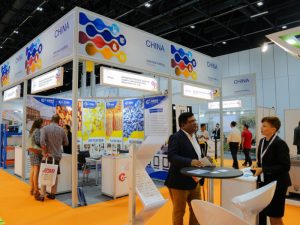UAE becomes central to China’s global export roadmap
Chinese expertise across the logistics eco-chain will be forefront at this year’s Materials Handling Middle East, the region’s dedicated warehousing, intralogistics and supply chain solutions show, which runs from September 3-5 and comes in the wake of game-changing UAE-China trade accords.

China, already the UAE’s second largest trading partner with about 6,000 Chinese companies operating in the Emirates, will have a dedicated pavilion featuring around 30 of the country’s biggest names at the Dubai World Trade Centre (DWTC).
Chinese involvement in Materials Handling Middle East follows the UAE and China recently signing US$ 3.4bn worth of new Belt and Road deals, which are expected to boost an existing US$ 53bn worth of bilateral trade to US$ 70bn next year.
The deals include Chinese plans for a 5.57mn sqm storage and re-export hub in Jebel Ali to trans-ship its goods to the world and the UAE plans for a US$ 1bn ‘Vegetable Basket’ project that will import, process, pack and export agricultural, marine and animal products through the new Silk Road under a UAE-China century of prosperity roadmap.
“The initiative opens up unprecedented partnership opportunities for region-wide logistics players as the UAE becomes an integral part of China’s Belt and Road initiative, combining a land economic belt and a maritime silk road linking China with South-East, South and Central Asia, the Arabian Gulf, North Africa and Europe,” explained Jasmeet Bakshi, Group Director, Services, Messe Frankfurt Middle East, organiser of Materials Handling Middle East.
Materials Handling Middle East will focus on multiple dynamic sectors including logistics and supply chain, retail, FMCG, automotive, oil and gas and pharmaceuticals, with all segments covered under the recent slew of 16 UAE-China trade accords.
